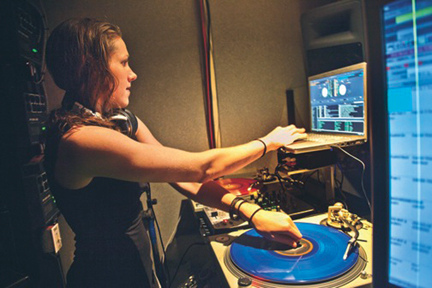She’s Got the Beats
Ashley Brandt ’07 moves through the worlds of music and medicine to her own rhythm.
 A bass beat pulses through the floor and up into the bodies of nightclub guests. The powerful pounding rhythm brings them to the dance floor.
A bass beat pulses through the floor and up into the bodies of nightclub guests. The powerful pounding rhythm brings them to the dance floor.
On this night at Sisters Nightclub in Philadelphia, [Kathryn] Ashley Brandt ’07 (aka DJ K.ASH) is the disc jockey responsible for providing a music mix that resonates with club guests.
“It’s all about the beats,” says Brandt, who pulls her music from multiple servers and has an estimated 20,000 mp3s in her playlist that includes everything from hip hop and rap to Top 40, reggaeton, and electronica.
Brandt [watch: Brandt in the DJ booth] plays music through a complicated, computerized, and visually mesmerizing virtual DJ program called Serato on her laptop, which is connected to a mixer and turntables comprising a multitude of knobs and channel sliders for mixing beats, adding effects, and adjusting the syncopation and volume. Her arms cross and uncross as she quickly manipulates the dials and buttons to get the sound mix exactly right. She tilts her head to the left holding the headphone between her shoulder and ear to cue the next song, all the while conversing with guests and checking her Blackberry for text messages.
Her computer monitor emits a colorful lightshow of audio waves, amplitude scales, and virtual spinning discs. Two real turntables with diamond-head needle tone arms are used for mixing and to create the scratching sounds.
Brandt, recently nominated for Best DJ in 2011 by the Philadelphia Gay News—she was the only female out of six nominees—prides herself on her ability to mix music. Mixing is the ability to blend two songs seamlessly and simultaneously. Then as one of those songs is about to end, the next mp3 is streamed in so that guests don’t experience an interruption to their dancing. “When people in the club hear the bass line they should not be able to tell they are hearing two songs,” she says.
Although Sisters is her main DJ residency (an ongoing gig) in addition to two other circuit parties at Stimulus Philly and the Scene, Brandt will soon have another—as a third-year medical student at the Pennsylvania College of Osteopathic Medicine. Brandt feels fortunate to have found a residency program that combines the two specialties in which she has an interest: emergency medicine and women’s health. She appreciates the quick pace of an emergency room. “However, I really am very invested in women’s health and also in having long-term relationships with patients, which is something you don’t get in the ER,” she says.
“I always like to joke that medicine and DJing have three things in common,” she says. “Your skill set is worthless without a residency, both provide equal access to drugs, and you’re up until the early hours of the morning.”
Although Brandt understands her club DJing may have to slow down to accommodate the long days and nights of a medical internship, she does not think it needs to stop.
“I believe it’s possible that I can DJ one or two nights a month for major events. I was told prior to starting medical school that it would be impossible to DJ and do well in school, which is something that I’m proud to have disproved,” says Brandt, who maintains an A average. “I can get home at 2:30 in the morning and be up for an 8 a.m. class.”
At some point, though, she’d also like to have children, leave the club DJ scene, and produce music from a home-based recording studio. “It’s something my family could also participate in, if my kids enjoy music and want to learn. And at the very least, I’d be at home with them instead of out at a club into the late hours of the night.”
But for now, the DJing is lucrative. “Let’s put it this way,” says Brandt, her eyes opening wide and a smile appearing on her lips. “I didn’t need to take out a Grad PLUS loan for med school.”
Brandt, who is a primarily self-taught DJ, began doing gigs on campus at Paces. Shortly after she was accepted into medical school, she won Best Female DJ in the first competition she entered in Philadelphia in 2009. In addition to Sisters, Brandt has DJed at other clubs along the Northeast Corridor and was also asked to DJ at Club Haute in Los Angeles for an episode of the television show The Real L-Word while it was filming there.
“DJing is very much a game that always changes, where I’m forced to react to what people want to listen to or are responding to. It’s also a challenge each time—trying new techniques and attempting to blend all different genres,” Brandt says. “At the end of a long day in a hospital, it’s nice to have this kind of break, where I get the chance to be creative. It keeps me very balanced in the long run.”
 Email This Page
Email This Page